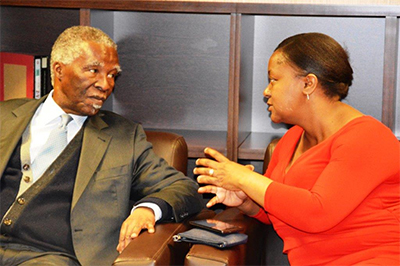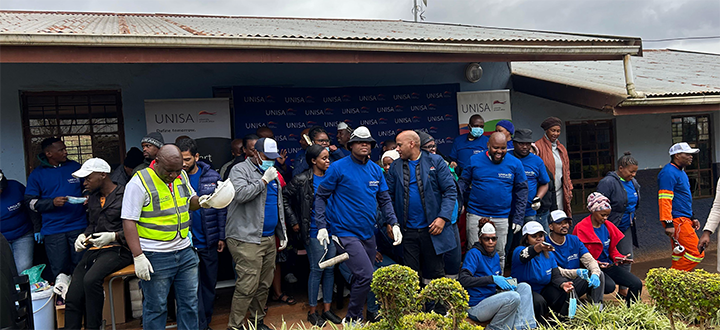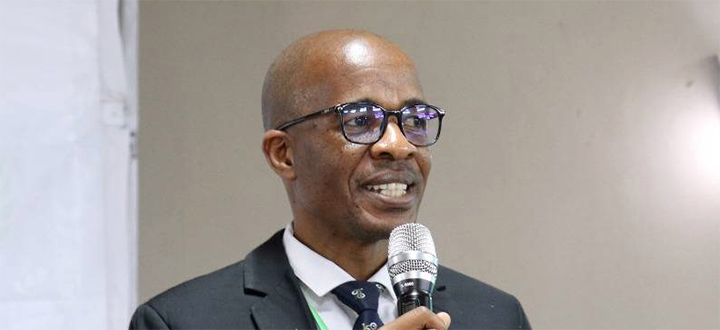College of Human Sciences
The scourge of sentencing violent crimes against women in South Africa

Dr Nokuthula Mazibuko (Department of Sociology) chats with former president and current Unisa Chancellor, Thabo Mbeki.
The popular discourse on femicide in South Africa is often linked to socio-economic deprivations of the majority of black population who live mainly in poor townships. However, this is not an accurate reflection of femicide says Unisa sociologist Dr Nokuthula Mazibuko.
“Femicide and other forms of violence against women, it is not class and race typical, it runs through all socio-economic classes and races.” She was speaking following a recent conversation she had with former South African president and current Unisa Chancellor, Thabo Mbeki, during a Thabo Mbeki African Leadership Institute contact session. She then conducted a desk review using media sources on the sentencing of femicide perpetrators. Based on this, she suggests that sentencing of femicide perpetrators is class and race typical.
Dr Mazibuko says that while violence against women is a global phenomenon, in South Africa, there is no denying that it is widespread. Femicide statistics from 2009 (which are the latest statistics on this crime) indicated the rate of femicide in South Africa stood at one woman killed by her intimate male partner every eight hours. Linked to this is the latest statistics from the SA Medical Research Council (MRC) which highlight that 40% of men assault their partners daily – and that three women in South Africa are killed by their intimate partner every day.
“South Africa has a rate of intimate femicide that exceeds reported rates for other countries. Very often we are led to believe that the perpetrators of this crime are black men who are poor and live mainly in townships. With this in mind, I studied media sources related to femicide in South Africa and the related sentencing in court. I believe that it is during sentencing where class and race begin to take centre stage.”
Dr Mazibuko adds that class and race are huge determining factors, not only in femicide court cases but this appears to be in all court cases related to violent crimes against women. She says while in recent months, South Africans seems to have finally awoken to this social ill that has been plaguing the country for decades, this “pandemic” has continued unabated, even though there is the Domestic Violence Act 116 of 1998.
Drawing from the 2016/2017 Domestic Violence Report by Statistics SA, Dr Mazibuko says Gauteng has the highest number of reported protection orders (79 542) while the Western Cape has the highest number of contravention orders (3108).
“South Africans need to critically evaluate these numbers and ask themselves if these protection orders and contravention orders are a viable solution or have they instigated femicide. Based on the findings of this report, I believe South Africans must recognise that violence against women is a serious social evil within our country.
“We should therefore be enacting legislation that focuses on femicide and violent crimes against women, considering the overwhelming statistics of brutality against women. We need to understand the need for these cases to be prosecuted and investigated in a unique and particular way because too often once these cases reach court, the factors that is class and race, then come into play.”
The value of women according to sentencing years
Citing examples from her study of media sources, Dr Mazibuko says, in 2012, Tina Mbili from Phoenix in Durban was assaulted and left for dead by her daughter’s father, Michael Padayachee. Only in 2015, was Padayachee sentenced to 24 years in prison for the assault.
“While this sentencing of 24 years might be suitable for this crime, it does not take into consideration the emotional, psychological and economical experiences of the victim. Mbili expressed in the newspaper that she constantly lives in fear. She has moved houses five times, keeps changes careers, and is constantly haunted by the last words of Padayachee, threatening to kill her once he is out of prison.”
In another example from 2014, a Soweto community radio presenter Donald “Donald Duck” Sebolai age 40 was sentenced to 20 years in prison for stabbing and murdering his 32 year-old girlfriend Rachel “Dolly” Tshabalala.
“The sentencing of 20 years for a 40-year-old Sebolai means he may be allegeable for parole in the future. If the parole is not granted, he will be released at the age of 60 years. This sentencing suggests domestic violence is not in itself a serious crime category and that the legal mechanisms to address this social phenomenon are limited; the law seems to be failing those affected by these crimes.”
Dr Mazibuko also speaks of the case of Pretoria model, Zanele Khumalo, who at age 18, was five months pregnant and murdered by her boyfriend and father of her unborn child, Thato Kutumela. He was sentenced to 20 years for the 2011 murder.
“The law in our country should have realised the there were two loves lost, that of the girlfriend and the unborn child. This suggests to me that the value of the woman in this case may have been 10 years and the unborn baby may have been the other 10 years.”
There is also the Oscar Pistorius case that made court and media history by being the first court case to be televised live, says Dr Mazibuko. “Even though South Africa has the highest reported rate globally of females murdered by shooting, in a country not at war, where men use guns to intimidate and assault women, Pistorius was sentenced to six years for shooting dead his girlfriend Reeva Steenkamp in his home in Pretoria.”
In another case where the South African laws look at class and race is that of Swedish businessperson Shrien Dewani, who was extradited to South Africa to stand trial for the murder of his wife Anni Dewani. “He was later acquitted due to lack of evidence. However, Xolile Mngeni was convicted for the murder and is currently serving a life sentence in Cape Town. Other accomplices, Zola Tongo was sentenced to 18 years, and Mziwamadoda Qwabe is serving 25 years.”
Dr Mazibuko adds: “And our most recent case of how sentencing of crimes against women is flawed is that of former Deputy Minister of Higher Education and Training Mduduzi Manana who was this week sentenced to pay a R100 000 fine or face 12 months in jail. This after he was convicted of three counts of assault with intent to do grievous bodily harm after pleading guilty to the charges. He was also ordered to complete 500 hours of community service and to complete a rehabilitation programme and pay the victims a total of R26 680, 46.
“How does this sentencing take into account the serious nature of violence our women face daily? We need to rethink how we move away from the current situation in which there is too little on holding perpetrators accountable.”
Being “gender typical”
Looking at the sentencing of women who commit violent crimes, Dr Mazibuko says gender, power and money are the order of the day. She cited the murder of Taliep Petersen which was orchestrated by his wife Najwa Petersen as one example. Petersen was sentenced to 28 years for the crime. In another example, Dina Rodrigues, who masterminded the murder of her boyfriend’s six-month-old daughter with an ex-girlfriend, is serving a life sentence for the murder of the baby.
Dr Mazibuko says in South Africa there is a patriarchy system of male domination and female subordination in economy, society and culture; this lends itself to the law and courts as well. “The crimes committed by Petersen and Rodrigues appears uncommon to a patriarchal society. The caregivers as killers is uncommon and this impacted on their sentencing.”
To further drive this point on how gendered and patriarchal the laws and courts can be, she juxtaposed the above sentencing with the account of how a poor black woman from Diepkloof, Soweto was stabbed 43 times and left for dead. “Her perpetrator, who is her ex-partner was sentenced to five years for stabbing her and one year for stabbing her new partner.”
Can SA resolve this?
According to Dr Mazibuko, her research has shown that to live in South Africa is to live in a state of paralysis, a coma of inculcated denial and repression. She says that while South Africa has the world’s most progressive constitution, which protects and enshrines the rights of women, we are the rape capital of the world.
“From the examples I have spoken about above, it would appear that the life of a man is more valuable than a life of a woman. For some reason we don’t take seriously the violent crimes that our women are victims of.”
She continues that South Africa must pay attention to the investigation and prosecution of crime involving domestic violence and ultimately femicide. Statistics, she says, indicates that cases of violence against women are increasing. And while there may be many gender initiatives and a national agenda, she believes along with other scholars, that these same initiatives seek to protect the system that keeps patriarchy intact.
“South Africa cannot afford to be part of the aggressive masculinity that has become intertwined with money and power. The statistics on femicide and violent crime against our women are alarming.
“As an activist of no violence against women and children, I recommend fairness in the judiciary when sentencing. We cannot afford to ignore this pandemic. People respond to the social order. If there is no social order, there is disorder. This violent crime against our women has taken on a life of its own.”
* By Rivonia Naidu-Hoffmeester (CHS communications and marketing)
Publish date: 2017-12-07 00:00:00.0


 Unisa to host historic National Dialogue kick-off
Unisa to host historic National Dialogue kick-off
 Facilitating specialist WIL opportunities for Nature Conservation students
Facilitating specialist WIL opportunities for Nature Conservation students
 Astro-tourism, deep space exploration and extraterrestrial life: the future of humanity
Astro-tourism, deep space exploration and extraterrestrial life: the future of humanity
 Unisa visits KwaShange Primary School in honour of Mandela Day
Unisa visits KwaShange Primary School in honour of Mandela Day
 Unisa ignites a records management revival in Zambia
Unisa ignites a records management revival in Zambia